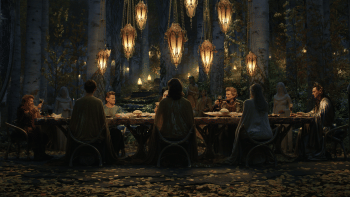Percy Jackson finally gets the adaptation he deserves

The article contains spoilers for the first three episodes of Percy Jackson and the Olympians.
Rick Riordan's middle-grade book series, Percy Jackson and the Olympians, captivating readers since its debut in 2005, follows Percy Jackson—the protagonist who struggles with ADHD, dyslexia, and getting into trouble, resulting in him being expelled every year since he started school. His father is Poseidon, the Greek god of the sea, storms, earthquakes, droughts, floods, and horses. In the first book, The Lightning Thief, having just found shelter at Camp Half-Blood, the home away from home for young demigods, 12-year-old Percy goes on a quest with his friends, Grover Underwood and Annabeth Chase. He sets out to save his mortal mother from Hades and the underworld and to find Zeus' master lightning bolt before a war breaks out between the gods.
One trap a lot of book-to-screen adaptations fall into is trying too hard to make the film or television series its own entity. Fans of those books want to see the stories they love brought to life, and it can be a disappointment when adaptations deviate from the core of their inspirations—often with detrimental consequences.
The 2010 and 2013 Percy Jackson films, despite Logan Lerman's charismatic lead performance, fell short of expectations, drawing criticism for creative decisions like omitting significant book sequences and ageing Percy prematurely to 16. Percy's story has gotten a second chance with a lavish Disney+ original series, which aims to rectify the faults of the previous films. Riordan co-created and executively produced the show, out now with its initial three episodes. The first season, spanning eight episodes, is based on The Lightning Thief.
Starting with the book's opening lines spoken by Percy (Walker Scobell) himself, the television adaptation establishes a commitment to honouring the source material right from the first frame. It is a thoughtful detail that not only sets the tone for the show but also serves as a reassuring nod to ardent fans, dispelling any apprehensions about this second attempt to bring Riordan's beloved Greek mythology-inspired tales to the screen.
The show swiftly delves into Percy's past and the imminent adventure awaiting him. He has been seeing and experiencing odd things for quite a while. Things take a dramatic turn when he's attacked by a winged fury (a spirit of vengeance that serves Hades) disguised as his pre-algebra teacher (Megan Mullally). The revelation thrusts him into a magical world teeming with Minotaurs (monsters that have the head of a bull and the body of a man), satyrs (creatures with the upper body of a man and the lower body of a goat), and destiny.
Percy's voiceover narration, which conveys crucial background information, aligns with the source material's first-person perspective. However, the adaptation is designed to trust fans of the books fully, and goes above and beyond to cater to them with details and easter eggs, leaving those unfamiliar with the nuances of the world scrambling to catch up. The Camp Half-Blood chapters are covered rapidly; the audience do not spend much time there.
Familial bonds take centre stage in the adaptation, similar to the books. Percy is distinctly portrayed as a devoted son, emphasising the emotional anchor his mother, Sally Jackson (Virginia Kull), provides. There is a softness to Sally when it comes to Percy, telling him that she believes he didn't push a student into a fountain and not being mad at him for getting kicked out of another school. And yet, when Gabe, Percy's stepfather, enters the scene, she turns hard and unforgiving towards the man, like a mama bear protecting her child from a threat.
In The Lightning Thief, Sally stays with Gabe because his pungent odour helps hide Percy from the monsters that would like nothing more than to devour him. She endures his mental and emotional abuse in order to protect her child—it is a sacrifice she makes willingly every day. The show, however, depicts Sally and Gabe's relationship through a different lens.
Making Gabe outright abusive and genuinely scary is too jarring for the inviting tone of the show, so it opts to depict him as unlikable, obnoxious, and lazy. None of these are positive qualities, but he seems like more of an annoyance to Sally and Percy than a legitimate concern.
Scobell and Kull's on-screen chemistry creates a genuine sense of love between their characters, and this is particularly evident in the pivotal scene where Sally tells Percy that his father is a god. The execution of this moment skillfully avoids potential awkwardness, steering clear of the often convoluted explanations of the fantastical elements of a magical world. Well-crafted writing and strong performances give the conversation a satisfying weight, capturing the authentic reactions a kid might have to such an earth-shattering revelation.
Percy, Annabeth (Leah Sava Jeffries), and Grover (Aryan Simhadri) charmed their way into my heart both individually and as a trio. The struggle of portraying genuine emotions is often evident among young actors, but in their case, the authenticity shines through. While adaptations have a tendency to "age up" their characters—whether by actually making them older or simply by casting older actors and actresses—that does not work for Riordan's book series because it is a story about kids growing up and discovering who they are, and Percy and his friends certainly act their age. The decision to cast age-appropriate actors not only preserves the integrity of the characters, but also enhances the relatability and sincerity of the performances. The dialogues allow the characters to feel like real children, such as when Percy and Annabeth bicker about what snacks to get and who is going to get them.

The books are lighthearted and fun, even in their darkest moments. Percy is a very funny and goofy narrator with a zinger for every situation. Riordan is a master at juggling serious topics with humour and hope, and the show succeeds at capturing this balance. However, while the books depict every one of Percy's thoughts in depth, the show, being a visual medium, is missing the wisecracks in his inner monologue. Nonetheless, Scobell more than makes up for it, capturing the character in all his snarkiness, but also his unflinching devotion to the people he cares about. Percy is on his way to becoming a real hero, even if it is more reluctant than willing.
Furthermore, the show offers a fresh spin on Medusa, making her a more tragic figure compared to the book. In The Lightning Thief, Riordan writes her as a black-and-white antagonist, who tries to turn Percy, Annabeth, and Grover to stone, only to be outwitted and beheaded. But in the original Greek mythology, Medusa's background is much darker. She is born a human and devotes herself to the goddess Athena, which involves pledging a life of celibacy. Medusa later engages in a sexual relationship with Poseidon—one that many versions of the myth portray as non-consensual—which causes Athena to take her beauty and turn her into a gorgon who can petrify her victims with a single glance.
In the television series, Medusa (Jessica Parker Kennedy) tells Percy that Poseidon claimed to love her. "I felt as though he saw me in a way I had never felt seen before. But then Athena declared that I had embarrassed her and I needed to be punished. Not him," she says. Earlier on, a flashback, hinting at this sensitive take on Medusa, shows Sally taking Percy to New York's Metropolitan Museum of Art where he sees Antonio Canova's statue of Perseus (Percy's namesake who also decapitates Medusa in the original myth) holding Medusa's severed head.
"Not everyone who looks like a hero is a hero, and not everyone who looks like a monster is a monster," she explains.
The change in Medusa's character keeps the narrative age-appropriate while acknowledging the disturbing elements of the original myth.
Overall, I think the show has transformed the Percy Jackson franchise from movie misfires to must-watch television. It has used its episodes wisely so far, adapting The Lightning Thief as accurately as possible. At times, this second attempt feels like an overcorrection, cramming in as many details from the source material as it can and sacrificing the script's flow in the process. But at its best, the adaptation reimagines the story for a modern audience, with the hope that a new generation of kids will grow up with Percy and his friends.
Shababa Iqbal is a Journalism graduate of Independent University, Bangladesh (IUB) and Sub-editor of ICE Today. She likes Jane Austen's novels and Disney movies. Email: [email protected].

 For all latest news, follow The Daily Star's Google News channel.
For all latest news, follow The Daily Star's Google News channel. 











Comments